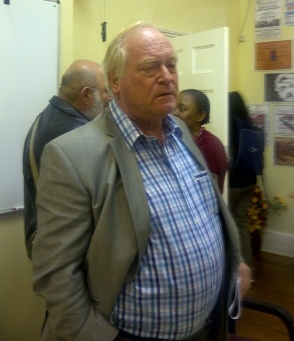
“Amongst speakers of the isiXhosa language along the southeastern seaboard of Southern Africa, oral literature can be found as poetry and song, riddles and proverbs, speeches, tales and history,” those were the words of acclaimed visiting languages academic, Prof Jeff Opland from the school of Oriental and African Studies, University of London.
The interesting presentation by Prof Opland who recently visited Rhodes to present on “Xhosa Literary Media: Spoken and Printed Words,” was made possible by the Rhodes University School of Languages and took place at a seminar room at the Humanities Department last week.
Professor Opland acknowledges in his presentation that “although by the end of the 20th century oral genres like amabali (“histories”) were weakening, and others like izibongo (“poetry”) changing, these Xhosa oral traditions persist to this day, and (that) there is no reason at all to doubt their existence in pre-colonial times.”
The paper also acknowledges that although isiXhosa as a language absorbed many loan words from other languages such as Afrikaans and English, whom they came into contact with after the 18th century, the language (isiXhosa) never suffered in terms of its structure and integrity as a result of the two (Afrikaans and English) culture contacts.
Professor Opland said that the Xhosa language suffered because there were (and still remains) very few books containing secular Xhosa literature being produced.
He said, “Books issuing from the various mission presses tended to be linguistic or religious, didactic rather than literary. With only a few exceptions, books containing original creative literature in Xhosa emerged as from the first decade of the 20th century.”
This sentiment was echoed by Professor Jeff Peires from when he said that it was very difficult these days to get any publisher willing to publish you unless your book was going to be read at school.
The paper also referred to the 19th century boom as the language (isiXhosa) witnessed an “explosion of literature in print, but not in the medium of books, but in newspapers this time around, and that major components of these newspapers derived from oral modes such as poetry, historical narratives and social news.”
About the missing growth of Xhosa literature as was the case in the maturing such literature in the 19th century the London based academic said, “We miss the growth of Xhosa literature to maturity in the 19th century, and we fail to understand fully its further development in the first half of the 20th century, if we overlook the literature contained in Xhosa language newspapers.”
He further said, “A number of the works of literature published as books in the 20th century drew on prior publication in newspapers; many of the major Xhosa authors of books also wrote for newspapers.” But, said Prof Opland, much of the literature contributed to newspapers has not subsequently appeared in print, and that the medium (Xhosa newspapers) was consigned to obscurity.
Amongst those who attended were the Dean of Humanities, Professor Fred Hendricks and the head of the School of Languages, Professor Russell Kaschula as well as other staff members and students.
Photo and article by Rudzani Floyd Musekwa
